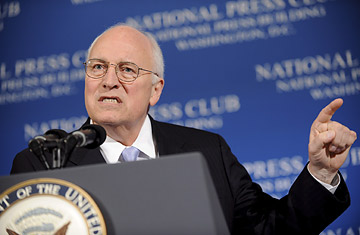
It's fairly common knowledge by now that pre-war statements made by top officials in the Bush Administration about Iraq were exaggerated or just plain wrong, based as they were on old or faulty intelligence. In that respect, the final part of Phase II of the Senate Intelligence Committee's Report on Prewar Iraq Intelligence doesn't break any new ground. What it does do, however, is try to make the case that President Bush and his advisers deliberately disregarded conflicting intel and misled Americans on the severity of the Iraqi threat.
West Virginia Senator Jay Rockefeller, the committee's chair, said it plain: "It is my belief that the Bush Administration was fixated on Iraq, and used the 9/11 attacks by al-Qaeda as justification for overthrowing Sadaam Hussein. To accomplish this, top Administration officials made repeated statements that falsely linked Iraq and al-Qaeda as a single threat."
The report brings to an end years of investigation by the committee into the use of intelligence in the period ramping up to the invasion of Iraq. Phase I of the report, released on July 9, 2004, looked at the intelligence community's assessments as to whether a) Iraq had viable weapons of mass destruction and b) whether or not Iraq and al-Qaeda were strongly linked. We now know that a) it did not and b) they did not.
But this report goes a step further, investigating "whether public statements and reports and testimony regarding Iraq by U.S. Government officials made between the Gulf War period and the commencement of Operation Iraqi Freedom were substantiated by intelligence information." In effect it's saying, words really do matter, especially when those words in question lead us to war.
The main focus is on five major speeches given in 2002 and 2003:
*Vice President Cheney, Speech in Tennessee to the Veterans of Foreign Wars National Convention, August 26, 2002
*President Bush, Statement before the United Nations General Assembly, September 12, 2002
*Bush, Speech in Cincinnati, October 7, 2002
*Bush, State of the Union, January 28, 2003
*Secretary of State Powell, Speech to the United Nations Security Council, February 5, 2003
Over those five speeches (along with some other public pronouncements), the Bush team laid out their case for invading Iraq. Thursday's Senate report compared those statements to hundreds of intelligence reports and concluded the following:
*Statements which indicated that Hussein was prepared to give WMDs to terrorists were inconsistent with existing intelligence at the time, as were statements that suggested a partnership between the two.
*Claims that airstrikes on their own would not be sufficient to destroy purported chemical and biological weapons in Iraq were unsubtantiated.
*Most statements that supported the theory that Hussein had access to or the capacity to build chemical, biological, or even nuclear weapons did not take into account the disagreements between intelligence agencies as to the credibility of the WMD allegations.
Missouri Senator Kit Bond, the ranking Republican on the committee, furiously wrote in his minority opinion, that the report was a blatant attempt by Democrats to politicize what turned out to be nothing more than bad intelligence on the part of the C.I.A. "We have been forced to waste countless man-hours to show what we and the American people already knew four years ago, that policymakers' statements turned out to be wrong after the war because the statements were based on flawed intelligence. The Committee's Phase I report, which investigated that intelligence failure and explained how it happened, was a judicious and valuable act of intelligence oversight. Distorting intelligence and misleading the public, as the current report does, it not."
Bond is so angry that he throws in some choice prewar statements that demonstrate that those in the Bush Administration weren't the only ones fooled by faulty intelligence. "I have come to the inescapable conclusion that the threat posed to America by Sadaam's weapons of mass destruction is so serious that despite the riskswe should authorize the President to take the necessary steps to deal with that threat." — Sen. John D. Rockefeller, Congressional Record, 10/10/02.
Bond goes on, excerpting statements from Senators Hillary Clinton, Christopher Dodd, John Kerry, John Edwards, etc. to show that those in the Bush bubble weren't the only ones beating the drums of war.
